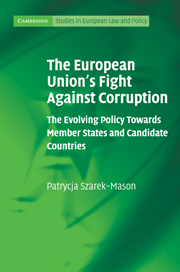 The European Union's Fight Against Corruption
The European Union's Fight Against Corruption Book contents
- Frontmatter
- Contents
- Table of cases
- Acronyms and abbreviations
- List of tables and figures
- Introduction
- 1 Corruption: concept, importance and international response
- 2 The scope of EU legal powers and development of the policy in the area of anti-corruption
- 3 The EU strategy against corruption within the Member States
- 4 Conditionality in the EU accession process
- 5 The EU's evaluation of corruption in the Central and Eastern European candidate countries
- 6 The EU anti-corruption strategy towards the Central and Eastern European candidate countries: achievement or missed opportunity?
- 7 The impact of 2004 enlargement on the EU anti-corruption policy
- 8 Conclusion
- List of interviews and consultations
- Appendix 1
- Appendix 2
- Bibliography
- Index
- CAMBRIDGE STUDIES IN EUROPEAN LAW AND POLICY
4 - Conditionality in the EU accession process
Published online by Cambridge University Press: 03 May 2010
- Frontmatter
- Contents
- Table of cases
- Acronyms and abbreviations
- List of tables and figures
- Introduction
- 1 Corruption: concept, importance and international response
- 2 The scope of EU legal powers and development of the policy in the area of anti-corruption
- 3 The EU strategy against corruption within the Member States
- 4 Conditionality in the EU accession process
- 5 The EU's evaluation of corruption in the Central and Eastern European candidate countries
- 6 The EU anti-corruption strategy towards the Central and Eastern European candidate countries: achievement or missed opportunity?
- 7 The impact of 2004 enlargement on the EU anti-corruption policy
- 8 Conclusion
- List of interviews and consultations
- Appendix 1
- Appendix 2
- Bibliography
- Index
- CAMBRIDGE STUDIES IN EUROPEAN LAW AND POLICY
Summary
The 2004 enlargement was the fifth enlargement in the EU history. It was also the biggest and most challenging of all the EU enlargements. As Cremona observed, it was perceived as much more than just a ‘joining of the club’ by a few more countries and has had an immense political and psychological significance as a ‘return to Europe’ by the CEE countries after the end of the divisions of the Cold War.
One of the most prominent features of the 2004 enlargement process was conditionality, defined as the linking, by a state or international organisation, of perceived benefits to the fulfilment of certain conditions. Setting the legal, political and economic membership conditions for joining the EU is a form of conditionality. In the preaccession process, conditionality followed ‘a strategy of reinforcement by reward’, which meant that the EU paid the reward if the government of a candidate country complied with the conditions and withheld the reward if it failed to comply. As Cremona noted, the conditionality within the EU's pre-accession process was designed to ensure that a candidate country's political, economic and regulatory development converged with the values and norms within the EU. Membership conditions were meant to ensure the proper functioning of the EU after the accession took place and also to reassure existing Member States that accession would not destabilise the EU. These concerns led to the establishment of extensive membership requirements and the application of both economic and political conditionality to encourage the CEE countries to carry out necessary reforms.
- Type
- Chapter
- Information
- The European Union's Fight Against CorruptionThe Evolving Policy Towards Member States and Candidate Countries, pp. 135 - 156Publisher: Cambridge University PressPrint publication year: 2010


